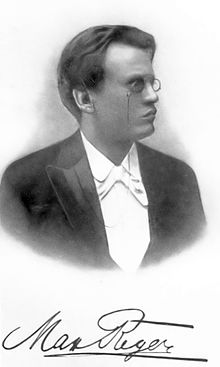Ein' feste Burg ist unser Gott ("A Mighty Fortress Is Our God"), Op. 27, is a chorale fantasia for organ by Max Reger. He composed it in 1898 on Luther's hymn "Ein feste Burg ist unser Gott". The full title is Phantasie über den Choral "Ein' feste Burg ist unser Gott".
| Ein' feste Burg ist unser Gott | |
|---|---|
| Chorale fantasia by Max Reger | |
 Reger in 1901 | |
| Opus | 27 |
| Based on | "Ein feste Burg ist unser Gott" |
| Composed | 1898 |
| Dedication | Karl Straube |
| Published | 1899 |
Background
editReger was raised Catholic but was fascinated by the variety of melodies of Protestant hymns, and used quotations from them throughout his life. He composed seven chorale fantasias in Weiden between 1898 and 1900, inspired by a fantasia on "Wie schön leuchtet der Morgenstern", Op. 25 (1895) of his teacher Heinrich Reimann.[1] Reger's fantasias follow Reimann's model of setting individual stanzas, connected by interludes.[2] Reger wrote the works for Karl Straube, whom he met in April 1898 when he played concerts at the Frankfurt Paulskirche, including parts of Reger's Suite for organ, Op. 16. Straube believed in Reger as a composer and premiered several of his works from manuscript.[3]
The text of the hymn was written by Martin Luther, published in 1529. Reger composed the fantasia in Weiden in August and September 1898, and dedicated it to Karl Straube, who played the first performance in Wesel on 20 September 1898.[4] It was the first work written for Straube, and the first work by Reger to find success with the public,[3] regarded as his breakthrough as a composer.[5]
The fantasia was published by Rob. Forberg in Leipzig in March 1899.[4] Reger had planned it as his Op. 27a, with Op. 27b a fantasia on "Freu’ dich sehr, o meine Seele". The second work was published by Jos. Aibl Verlag as Op. 30.[6] Ein' feste Burg ist unser Gott, as other chorale fantasias by Reger, is more often performed in concert than in liturgical church services, because of its dimensions.[5] Reger commented the alleged difficulty of his organ works in 1900 to his friend the organist Gusav Beckmann: "Meine Orgelsachen sind schwer, es gehört ein über die Technik souverän herrschender geistvoller Spieler dazu" (My organ pieces are difficult; they need a skillful player who masters the technique).[7] The organist Alfred Sittard first recorded this work by Reger on shellac in 1908 on the Sauer organ of the Berlin Garnison Church.
References
edit- ^ Greenbank 2016.
- ^ Institute works 2016.
- ^ a b Weiden 2016.
- ^ a b Institute 2016.
- ^ a b Geistlich 2016, p. 7.
- ^ Szabó 2016.
- ^ Trier 2016.
Bibliography
edit- Reger, Max. Sämtliche Orgelwerke. Vol. Band 6. Choralfantasien. Wiesbaden/Leipzig/Paris: Breitkopf & Härtel. pp. 91–147.
- Reger, Max. Max Reger (1873–1916) / Fantasia on the Choral 'Ein feste Burg ist unser Gott' Op. 27 / Breitkopf Urtext edited by Hans Klotz [org] 14' / Breitkopf Urtext on the basis of the Reger Complete Edition ed. by Hans Klotz, critically examined by Martin Weyer with an introduction by Hans Haselböck. Wiesbaden/Leipzig/Paris: Breitkopf & Härtel.
- Greenbank, Stephen (2016). Max Reger (1873–1916) / Chorale Fantasies. musicweb-international.com. Retrieved 7 September 2016.
- Popp, Susanne (2007). Busch, Hermann J. (ed.). Zur Quellenlage der Regerschen Orgelwerk (in German) (2 ed.). Kassel: Merseburger Verlag.
{{cite book}}:|work=ignored (help) - Rahner, Hugo Ernst (1936). Max Regers Choralfantasien für die Orgel. Eine Studie über Grundlagen und Werden des Regerschen Orgelstils (in German). Kassel. pp. 46 sqq.
{{cite book}}: CS1 maint: location missing publisher (link) - Szabó, Balázs. Zur Orgelmusik Max Regers (PDF) (in German). Bonn: Dr. J. Butz. p. 19.
{{cite book}}:|work=ignored (help) - Straube, Karl, ed. (1952). Briefe eines Thomaskantors. Stuttgart. p. 236.
{{cite book}}: CS1 maint: location missing publisher (link) - "Phantasie über den Choral "Ein' feste Burg ist unser Gott" Op. 27"". Max-Reger-Institute. 2016. Retrieved 7 September 2016.
- "Band I/1 Choralphantasien". Max-Reger-Institute. 2016.
- "Max Regers Choralfantasien für Orgel op. 27, op. 30, op. 40 und op. 52" (in German). SWR. 25 May 2016. Retrieved 7 September 2016.
- Max Reger – Das Geistliche Lied als Orgellied – eine Gattung entsteht (PDF) (in German). qucosa.de. Retrieved 7 September 2016.
- "Keine Note zuviel! / Ökumenische Trierer Veranstaltungsreihe zum 100. Todesjahr von Max Reger" (PDF) (in German). trierer-orgelpunkt.de. Retrieved 11 September 2016.
- "Max Reger / 1898 Rückkehr nach Weiden" (in German). max-reger-orgel.de. Retrieved 11 September 2016.
External links
edit- Scores of Op. 27 at IMSLP
- Music manuscripts Max-Reger-Institute
- Max Reger: Organ Works – Choralfantasie "ein' Feste Burg Ist Unser Gott" Op. 27; Introduktion, Passacaglia Und Fuge E-moll Op. 127 Archived 2016-09-17 at the Wayback Machine arkivmusic.com
- Max Reger / Organ Works Vol. 2 klassik-heute.com